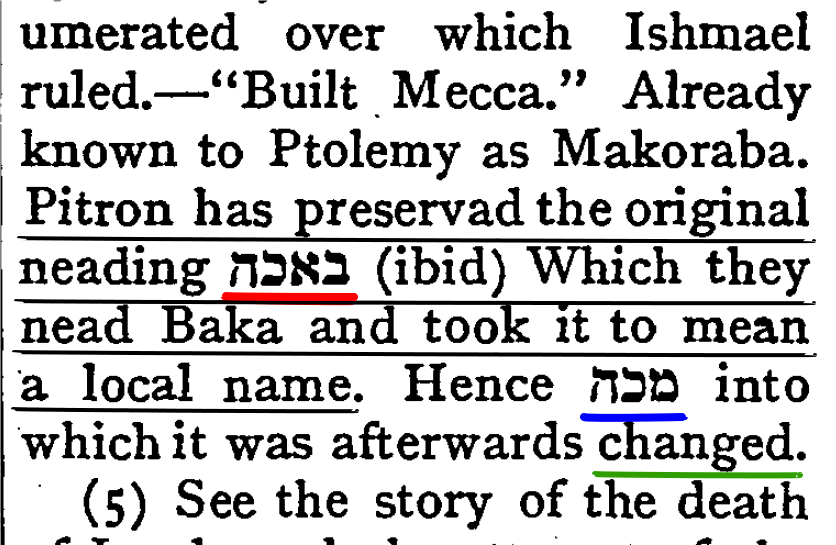CD....
Other scholars also shares a similar view. This of course explain why rabbi Saadia Gaon has mentioned Mecca and Medina in Genesis 10:30. This is not only his paraphrase concluded from the context as some might think, because if you go to the Hebrew text you will notice there such word as
באכה (baka) which was translated as “as thou goest” !
ויהי מושׁבם ממשׁא באכה ספרה הר הקדם
On that occasion it must be stressed that the Hebrew
משׁא (Mesha), that preceds
באכה, does not stand here for Mecca as some of you would suppose. Lexicons says that this word is of foreign derivation, and there is no consensus as to whether it refers to a place somewhere in Arabia, or to a region, or to a north Arabian tribe. In any case, we have to concentrate on
באכה (bakah), and it would be quite preferable to remember this word in its exact Hebrew form for the next portion of information’s.
The second proof which Allah Almighty let me to discover comes from a rare book called
The Asatir: The Samaritan Book of the Secrets of Moses which was translated and published by Dr. Moses Gaster in 1927. This ancient document according to Dr. Moses is much older than Josephus or the Palestinian Targum, and after comparing it with the other manuscripts assumes that this book could not have been compiled later than between
250-200 B.C. In Chapter VIII of this book we read:

No comment… you have a crystal clear proof! But let’s read what Dr. Moses have said in his commentary to the last fragment “Built Mecca” of the verse 3:
 Reference: The Asatir: The Samaritan Book of the Secrets of Moses, together with the Pitron or Samaritan commentary and the Samaritan story of the death of Moses
Reference: The Asatir: The Samaritan Book of the Secrets of Moses, together with the Pitron or Samaritan commentary and the Samaritan story of the death of Moses, introduction, translation and notes by M. Gaster, Ph.D. (London: The Royal Asiatic Society, 1927), p. 262.
Notice the same word
באכה (Baka) which can be found in the Hebrew text of Genesis 10:30 !
Mecca was mentioned among others biblical places, and so in the first and oldest book of the Torah. On the other hand, Ptolemy’s Makoraba - or most probably Makkorabba as some scholars suggested – is also an intriguing issue, and it seems that this word consist of two separable segments, namely:
1. Makko = Mekka = Bakka
2. Rabba = from rabb which means in arabic "The Lord"
Based on this, it can be translated literally as “Mekka of the Lord” or “the Lord of Mekka”. Such interpretation is reinforced by discovering an inscription which was engraved in one of the corners of the foundation of the Kaaba during its renovation in 605 A.D. by the people of Quraysh. The mysterious writing was composed in Syriac as relates Ibn Ishaq, and they could not understand it until some Jew read it for them. The text goes as follows:
“I am Allah, the Lord of Bakka, I created it on the day that I created heaven and earth and formed the sun and moon, and I surrounded it with seven pious angels. It will stand while its two mountains stand, a blessing to its people with milk and water.” [Ibn Ishaq,
Sirat Rasul Allah, trans. A. Guillaume, (Oxford: Clarendon Press, 2004), pp. 85-86.]
Ibn Ishaq immediately after citing this amazing inscription have said:
“I was told that they found in the maqam a writing: ‘Mecca is God’s holy house…”I believe this is the answer, because if Ptolemy by saying Makorabba has in mind a temple rather than a city it would make sense in relation to what we have just read, i.e. that Mecca according to the writing on
maqam was called a “holy house of God”, and in result this perfectly fits the conception about Ptolemy’s Makkorabba as “The Lord of Mekka”. Some scholars also have proposed the translation “The Temple of the Lord” which again leads to the same point.
Anyway, in conclusion we have at least two strong proofs directly from an ancient source showing that Mecca is a historical location and indeed existed long before Christian era, and as it is testified by ancient versions of Torah. The Christians of course will try to deny their authority as usually.
Take care, and salam
Ahmed (Poland, Warsaw)
